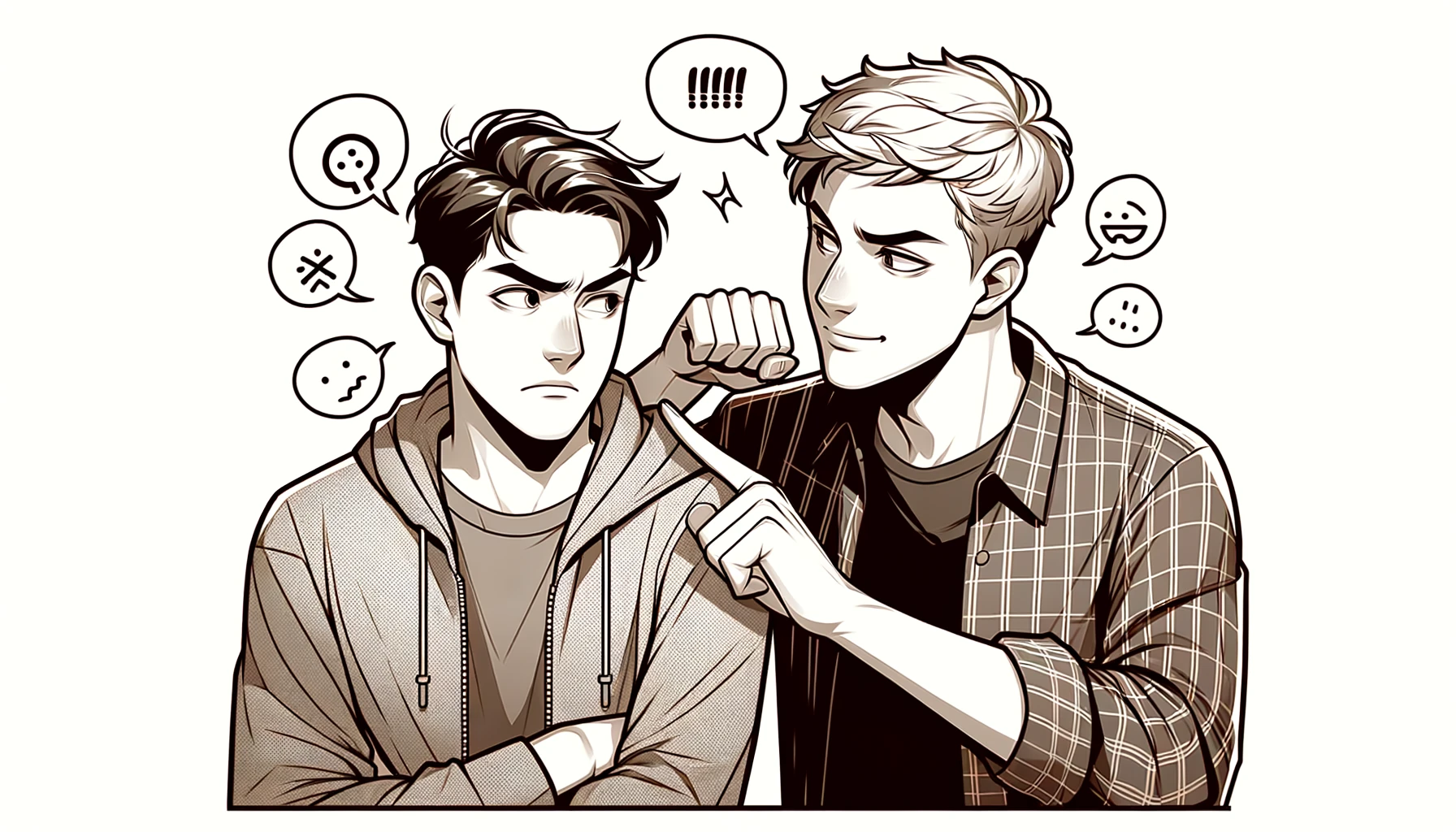Sharing is caring!
Have you ever been in a spot where someone was being mean or trying to bully you, and you just didn’t know what to say back?
It happens to a lot of us. Sometimes, people can say things that are not nice, and it makes us feel pretty bad.
But guess what?
There’s a way to stand up for yourself without being mean back. This article is all about funny and savage comebacks that can help you do just that.
These comebacks are like secret weapons. They’re smart and funny, and they can help you show that you’re strong without starting a fight. It’s like having a shield made of words.
When someone tries to be mean, you can use one of these comebacks to protect yourself and maybe even make them think twice about being mean again.
With these comebacks, you can brush off the negativity and maybe even share a laugh.
Best Comebacks For Bullies

1. “Wow, picking on others? Hope you’re collecting points for something.” – A way to highlight how pointless their bullying is, as if they’re doing it to earn points for a game that doesn’t exist.
2. “Do you feel better now, or do you need to say a few more mean things?” – This questions the bully’s need to be mean, suggesting it’s supposed to make them feel better but it really doesn’t.
3. “I’m rubber, you’re glue, whatever you say bounces off me and sticks to you.” – A classic comeback that tells the bully their words can’t hurt you but reflect poorly on them.
4. “Thanks for the attention, but I’m not signing autographs today.” – Turns their bullying into a joke, as if they’re just a fan trying to get your attention in the wrong way.
5. “Oops, did I just step into a time machine? Because I thought playground bullying was behind us.” – Points out how childish and outdated their bullying behavior is.
6. “Keep talking. I’m conducting a study on how long someone can be ridiculous.” – Suggests their bullying is so absurd, it’s become a subject of study.
7. “Should I be writing this down? Feels like you’re giving a masterclass in nonsense.” – Implies that what the bully is saying is so pointless, it could be a lesson in how not to make sense.
8. “I’d love to stay and chat, but I left my interest in your opinion at home.” – A humorous way to say that what the bully thinks or says about you isn’t important to you.
9. “I didn’t know we were playing ‘Who Can Be Ruder.’ I’m unprepared.” – Points out their rudeness while pretending you missed the memo that it was a competition.
10. “Your words are like rain; I just put on my positivity umbrella.” – A way to say that their negativity doesn’t reach you because you protect yourself with positivity.
11. “Is there a point, or do you just enjoy hearing yourself talk?” – Questions the purpose behind their words, implying they’re just talking to talk.
12. “Wow, did you invent bullying, or are you just practicing ancient techniques?” – Sarcasm that highlights how outdated and unoriginal their bullying is.
13. “Congratulations! You’ve won the ‘Least Likely to Cheer Someone Up’ award.” – Turns their negativity into a mock award, highlighting their lack of positivity.
14. “If talking to me is so bad, why do you keep doing it?” – Questions their logic in continuing to interact with you if they seem to dislike it so much.
15. “I’m updating my ignore list. Would you like to be at the top?” – Pretends you have a list of things you ignore, offering them the top spot.
16. “Sorry, my interest in your opinions is currently on a break.” – Suggests you usually might care, but right now, your interest is “taking a break.”
17. “If I agreed with you, we’d both be wrong.” – Points out the flaw in their logic or opinion without directly insulting them.
18. “Oh, are we at the part where I pretend to be offended?” – Acts as if their attempts to bully are part of a script where your feelings are supposed to be hurt.
19. “I’m not a mirror; please take your negativity elsewhere.” – Suggests that whatever negativity they’re offering is really a reflection of themselves.
20. “Oops, looks like your kindness filter needs fixing.” – Pretends they have a “kindness filter” that’s malfunctioning, leading to their current behavior.
21. “Should I be writing this down? Feels like a lesson in how not to make friends.” – Implies their actions are a perfect example of what not to do when trying to be friendly.
Funny Comebacks For Bullies

22. “Wait, was that supposed to hurt? Let me laugh harder.” – Acts as if their attempt to bully was a joke, and the appropriate response is laughter.
23. “Your effort to bring me down is noted, but my elevator only goes up.” – A metaphor suggesting that you’re only interested in positive ascension, not negativity.
24. “Keep going; I’m sure someone finds you interesting.” – Suggests that while you find their bullying uninteresting, perhaps someone else out there might appreciate it.
25. “I’d block you in real life right now if I could.” – Compares dealing with them to social media, where unwanted interactions can simply be blocked.
26. “Are we playing a game where you say nonsense, and I pretend to listen?” – Treats their bullying as a nonsensical game where you’re humorously disinterested.
27. “I’m sure you have good qualities, but you’re playing hide and seek with them right now.” – Suggests their positive traits are hidden behind their current behavior.
28. “Oh, I didn’t realize we were playing ‘Who Can Say the Meanest Thing.’ I’m not prepared.” – Suggests their meanness is part of a game you didn’t sign up for.
29. “Your words are like a mystery novel; they make no sense to me.” – Compares their negative comments to a confusing story.
30. “Did you learn that insult in a class, or are you a natural?” – Wonders if their ability to insult is self-taught or innate.
31. “I’m sorry, I only speak kind language. Can you translate?” – Pretends you can’t understand anything that isn’t kind.
32. “Are we collecting points for rudeness now? What’s the prize?” – Acts as if their meanness earns them points toward a non-existent reward.
33. “I’d look for your good side, but I don’t have a magnifying glass.” – Jokes about their good qualities being hard to find.
34. “I’d help you be nicer, but I left my magic wand at home.” – Suggests it would take magic to improve their attitude.
35. “Oh, was that your attempt at humor? Let’s work on your delivery.” – Treats their mean comment as a bad joke.
36. “I think your kindness is on mute. Want to try unmuting it?” – Compares their lack of kindness to a muted microphone.
37. “Wait, let me put on my surprise face.” – Acts unsurprised by their predictable negativity.
38. “If being nice was a crime, you’d be innocent.” – A playful way to point out their lack of niceness.
39. “Is being mean a hobby, or just a bad habit?” – Questions whether their negativity is intentional or just a habit.
40. “I’d agree with you, but then we’d both sound silly.” – Suggests agreeing with them would make you both look bad.
41. “Oops, did you mean to say that out loud?” – Implies their mean comment was supposed to be a thought, not spoken.
42. “Are you practicing for a role as the grumpy character in a movie?” – Suggests their behavior fits a stereotypical grumpy role.
43. “I think you dropped something: your manners.” – Pretends they physically lost their good manners.
44. “I’d engage, but I prefer conversations that go up, not down.” – Prefers discussions that are uplifting, not demeaning.
45. “Your ‘mean’ button seems to be stuck on; maybe time for a reset?” – Imagines their meanness as a button that’s jammed.
46. “I would play back, but I’m not a fan of the mean games.” – Chooses not to engage in negativity as if it were a game.
47. “Do you have a license for distributing that level of sass?” – Jokes about needing permission to be that sassy or rude.
48. “I’m not a detective, but I think you’ve misplaced your kindness.” – Pretends to search for their missing kindness.
49. “Oh, I thought today was opposite day. My mistake.” – Acts as if their negative comment was intended to be positive.
50. “Your talent for negativity is astounding. Ever thought of going pro?” – Marvels at their skill in being negative as if it were a sport.
51. “I’d join in, but I’m allergic to negativity. Makes me break out in smiles.” – Claims an allergy to negativity that causes positive reactions.
52. “Should I schedule our next insult session, or are we improvising?” – Asks if their mean comments are planned or spontaneous.
53. “I’m compiling a dictionary, and your comments are perfect for the ‘don’ts’.” – Collects their negative remarks as examples of what not to do.
54. “Are we testing my patience today? How am I doing?” – Treats their behavior as a test of your patience, asking for a score.
Savage Comebacks For Bullies

55. “Is there an echo in here, or do you always repeat the same nonsense?” – Points out if they keep saying unkind or repetitive things.
56. “I’d give you a comeback, but I like to donate my kindness where it’s appreciated.” – Suggests you’d rather not waste your words on someone who won’t value them.
57. “Your opinion is in another castle. Guess we’ll never find it.” – References video game quests to suggest their opinion is lost or irrelevant.
58. “If being rude was a sport, you’d be in the major leagues.” – Compares their rudeness to a professional level of skill, but in a negative trait.
59. “Oops, I forgot to laugh. Remind me again why that was funny?” – Acts as though you missed the point of their joke because it wasn’t funny.
60. “Do you practice being this rude, or is it a natural talent?” – Wonders if their ability to be rude is something they’ve worked on.
61. “I’m not a mirror; stop talking to me like you do yourself.” – Suggests they are projecting their own feelings onto you.
62. “Your words are like a rainstorm, and I forgot my umbrella. Oh well, I’ll dry.” – Implies their words might try to dampen your spirits, but you’ll recover.
63. “Guess it’s opposite day again. I’ll mark my calendar.” – Pretends their insult is a compliment because it’s opposite day.
64. “I’d get into a battle of wits with you, but it seems you’re unarmed today.” – Points out that they’re not being smart or witty with their comments.
65. “Keep talking; maybe you’ll say something nice by accident.” – Hopes that if they continue, something positive might slip out.
66. “I’m sure there’s a point to your words. Too bad it’s lost.” – Suggests their comments might have a purpose, but it’s nowhere to be found.
67. “Sorry, I only take criticism from people I respect.” – States that their opinions don’t affect you because they lack your respect.
68. “Wow, I didn’t know we were playing ‘Throw the Insult’. I’m out of turns.” – Pretends you’re in a game where insults are thrown, but you’re choosing not to play.
69. “Are you always like this, or am I just lucky?” – Questions whether their negative behavior is constant or if you’re just experiencing it now.
70. “I’d agree with you, but then we’d both be mistaken.” – Suggests that agreeing with them would lead to both of you being wrong.
71. “If I wanted to listen to an annoying noise, I’d buy a broken alarm clock.” – Compares their bothersome words to a persistently irritating sound.
72. “I’d stay and chat, but I’m allergic to negativity.” – Claims an allergy to negative vibes as a reason to exit the conversation.
73. “Your words are like a pencil without lead – pointless.” – Compares their meaningless comments to a tool that can’t fulfill its purpose.
74. “Keep rolling your eyes; maybe you’ll find a brain back there.” – A sassy response to someone who rolls their eyes at you, suggesting they’re lacking in thought.
75. “I’d explain why that’s wrong, but I don’t have the time or the puppets.” – Implies their understanding is so basic, you’d need to simplify the explanation to an extreme degree.
76. “Do you ever listen to yourself, or do you just hit ‘speak’ and hope for the best?” – Questions whether they think before they talk or just say whatever comes to mind.
77. “If being annoying was a class, you’d be the teacher.” – Suggests they’re so skilled at being bothersome, they could instruct others.
78. “Is this the part where I pretend to be upset, or can we skip it?” – Acts as if their attempt to bully is part of a script that you’re both following.
79. “Are we playing ‘Make Believe’? Because I don’t believe anything you say.” – Treats their words as part of a game where truth is irrelevant, showing you’re unaffected.
Sharing is caring!
